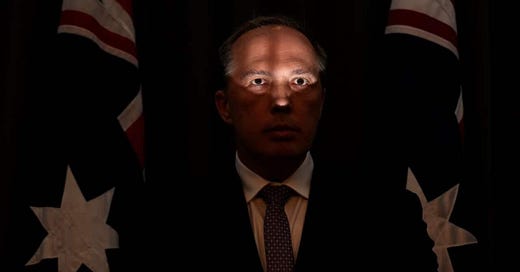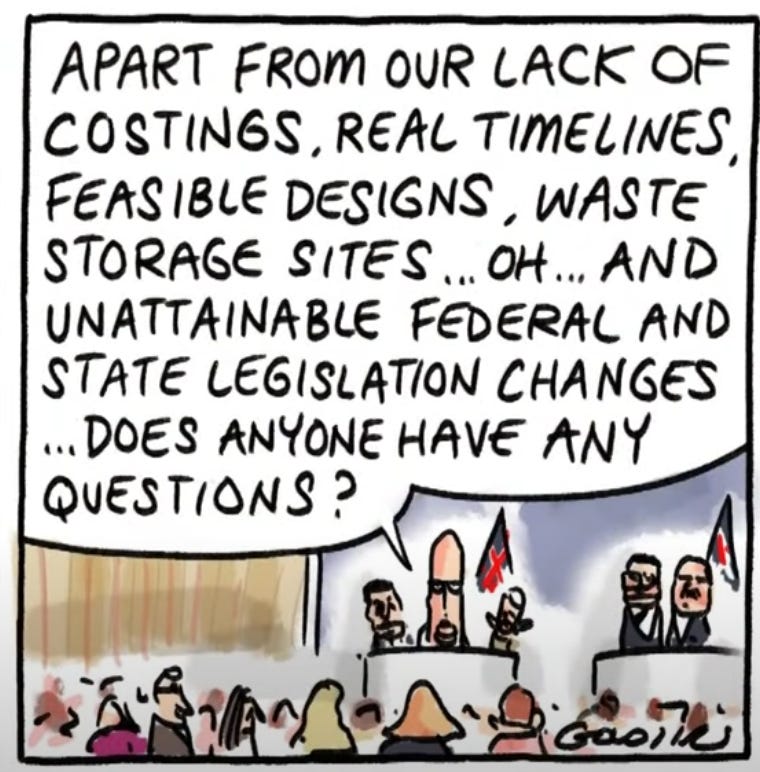The curious case of Benjamin Dutton
The referendum on nuclear and an appeal to very serious people
Benjamin Button is a fictional character who is born an old man and ages backwards. Naturally, Benjamin Button baffles people. But his story (at least, the movie version), is a love story.
Opposition leader Peter Dutton does not seem to be aging backwards. His energy policy is different. It’s Dutton’s love story. It’s baffling. And it definitely feels like we’re watching energy policy age backwards.1
Opposition leader Peter Dutton and opposition energy spokesperson Ted O’Brien have been doing the rounds pitching their new energy policy. Their plan is tax-payer owned nuclear power. Just don’t ask for more details because they don’t exist.
We’ve made no secret of what we think of nuclear. There are a multitude of experts who’ve dedicated posts and columns and more to explaining the folly of relying on nuclear power. Fellow NEM Substacker Michael Mazengarb does a good job of summarising these arguments.
Rather than focusing on the lack of detail in the Coalition’s plan, I was more perplexed by the willingness of Dutton to commit to the next election being a referendum on energy policy. I don’t think Dutton cares for much apart from becoming Prime Minister but is he really willing to bet the house on nuclear?
Dutton’s ascent
Peter Dutton was selected as the leader of the Opposition after the 2022 Federal election, where the Liberals got rinsed. How much of a factor was climate change? The huge vote for the Greens and Teals suggested that many voters were turning away from the unambitious policies offered by Labor and the Liberals. However, the Liberal Party seem to think somewhat differently — “climate” only gets one mention in their post election review.
Dutton was not chosen as party leader to be ambitious on climate change. He’s not renowned for his sensitivity to the dangers of climate change. Indeed, after becoming leader he didn’t spend much time talking about climate change — instead, he focussed on bread and butter issues like cost of living.
But old habits die hard. With some healthy egging on from the National Party, the temptation to return to the climate policy wars proved too great for the Liberal Party. Over time, their position became what we’re seeing now — an attack of renewables, a reliance on nuclear, and ditching our emissions targets.
The appeal to the “very serious” voter
Why do Dutton and co think this is a winning strategy? How would you run an election campaign with this as the cornerstone?
Having watched Dutton and O’Brien spruik the policy the strategy seems to revolve around casting the Liberal Party as the adults in the room. Their hope is that they can conflate the cost-of-living crisis and high energy bills with the current government and renewables. They are pushing this narrative that the energy transition is being harried along by chaotic greenies with no regard for the impact on quiet Australians.2 By inference, their very grown-up, serious policy of building nuclear is the stable option, i.e. we can decarbonise, but more slowly, more measured and at a lower cost.3 This isn’t dissimilar to previous Liberal election campaigns where their primary message is that they’re the responsible economic managers.
Pilita Clark wrote an article on the concept of the very serious person in the climate debates.4 The article discusses the idea that one of the biggest impediments to resolving climate change are “very serious people.” While these people aren’t explicitly against addressing climate change, they will paint ambitious actions to address climate change as being divorced from reality because the costs are extreme, or it will destroy the economy, or the timeframes are unrealistic etc.
The Coalition’s narrative selling their nuclear policy seems to be an appeal to “serious people.” Most pro-nuclear people are very serious people. They don’t seem to explicitly love nuclear — rather, they love letting people know that they, unlike most, get it. They understand that “renewables can’t supply our grid and we need nuclear.”
Can this win an election?
I think both sides in the energy bubble had an intuitive reaction to this proposal.5 Most of us instantly disparaged the policy. A smaller contrarian group were always going to like it. My non-scientific survey of LinkedIn suggests the biggest demographics coming out in favour of Dutton’s plan are a specific type of old academics and some teenagers from Queensland who might be old enough to vote. Fortunately, my LinkedIn is not representative of the real world. But who are the voters this will win over that wouldn’t have otherwise voted for the Liberals?
Realistically, will the weight of evidence against nuclear win? We’d like to think so, but even obvious flaws are easily papered over in a debate over slogans. My gut feel is direction of the electorate will be split along two fault lines.
Renewables are good and cheap vs. renewables are expensive and not working well.
Nuclear is dangerous vs. nuclear is safe.
The first debate is prime culture war. The Liberals will hope the debate devolves into a both sides swamping each other with slogans and both media camps pushing their team. Based on the last election result, it’s not obviously a winning strategy. But there are the global swings from right to left and back to right and Dutton is no doubt taking some inspiration from resurgent conservative swings in places like Europe and the US.
The second debate might actually be the harder one. The safety concerns about nuclear are the first thing most of us think of. Whether it’s Chernobyl, Fukushima, Three Mile Island or the Simpsons, most pop culture portrayals and real world examples of nuclear are concerning. The safety risks of modern nuclear are generally quite low compared to what happened at Chernobyl for example. But it also makes the Opposition vulnerable to pressure from Labor, The Greens and the Teals, particularly given there is no detail.
The Liberal Party lost government because they didn’t make big gains in outer suburbs and they lost heartland inner city seats. The Liberals’ revised electricity policy is a shift to the right. This means a continued drift away from what’s going to win voters in those heartland seats. It will be difficult for new Liberal candidates in Kooyong, Wentworth and North Sydney to dislodge the teal independents if the election is centred around renewables vs. nuclear.
Similarly, I doubt there is much to be gained for the Liberal Party in regional seats. While it might appeal to some communities concerned about the impact of renewables and transmission infrastructure, the Coalition are also going to have to deal with the inevitable push back from the electorates expected to host these nuclear plants. Rural and regional electorates are also already well represented in the Coalition, meaning big gains in these seats alone would not get them into power. It’s telling that each of the seven proposed nuclear host sites are in currently held Coalition seats.
This leaves the outer suburbs. These are the seats that Dutton feels represents the future of the Liberal Party base. They’ve not made decent inroads yet — Labor did well in the recent Dunkley by-election. However, I think these suburbs will be where Dutton and the opposition spend most of their time selling their policy. Do I think it will work? Time will tell — apparently nuclear appeals to older voters, but it also leaves the Coalition vulnerable to counter-attacks. There have already been stories of division in the Coalition, and there is a real risk this derails Dutton’s tilt at PM.
The end
The Coalition’s nuclear plan is jarring to most people who work in energy. Given the legal, economic and environmental barriers, it’s hard to believe the Coalition is genuinely running on building seven nuclear power plants. It’s hard to believe that voters actually think this policy has enough meat on the bones to be convincing at the polling booths, let alone providing a blueprint for radically overhauling the Australian energy landscape.6
The Liberals feel that this policy is significantly different enough that it differentiates them from Labor. And that this differentiating point, during a time when many Australians are acutely aware of the cost of living, will be seen as serious, rational and prudent in the eyes of very serious voters.
I think most of us want to be very serious people some times. We also know that addressing climate change, and energy security, reliability and costs, are serious and difficult (and important!) challenges. For Dutton and the Coalition, the key question is whether they can convince enough people that nuclear is what serious people should support. Or whether serious people will see through the policy for what it is — a flimsy pathway to The Lodge, built on the ruins of energy policy stability and our prospects of meeting emissions targets.
You might think this is a stretched metaphor, but at Currently Speaking we can hardly spell, let alone come up with coherent metaphors.
Are quiet Australians overly represented in the survival horror movie A Quiet Place? Or are they under-represented there as well?
To be clear, I strongly do not agree with this.
I found the article referenced in a Ketan Joshi post.
The psychologist Jonathan Haidt talks about how we tend to make decisions based on our intuition, and use logic to back-fill and reaffirm this intuition. I felt that in this debate.
Other commentators have pointed out that within this announcement — an entirely federal government owned multi-GW capacity of nuclear generation in nearly every Australian state — are sweeping consequences on the existing design of the market(s), the ownership structures, the investment structures, the demand patterns and even individual consumer preferences for things like rooftop solar. The policy has been pitched as a carbon-free drop in replacement for existing coal-fired units, but it’s hard to state how radical a departure from the status quo this policy actually would be.







Interesting that something along the lines of 'a plan for nuclear is a plan for more coal & gas' is absent here
"inspiration from resurgent conservative swings in places like Europe". Yes I expect this to happen in Australia too, only a matter of time. Dutton is probably a tad early to take full advantage. As an environmentalist, I'd prefer to see nuclear in the mix as it enables decarbonisation with the lowest environmental footprint - and yes we still need this by the time they are built. I actually think adding nuclear in the mix and taking a more pragmatic approach will help wind and solar in the long term. The current policy trajectory is likely to see them become increasingly unpopular as penetration levels increase.